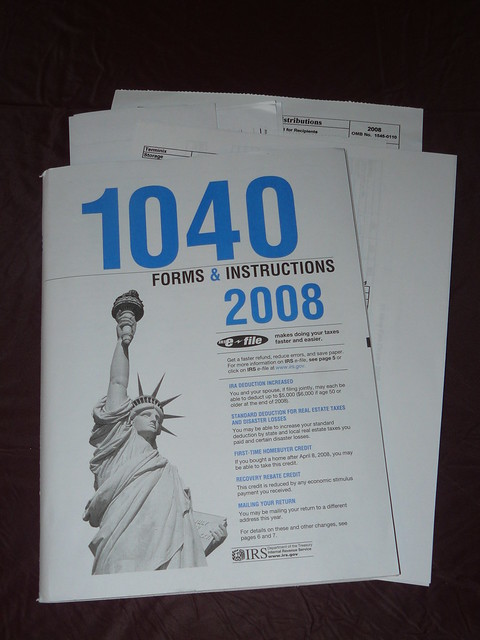Taxes
Local Governments Rebuff Efforts to Turn Off Red Light Cameras
Probably the biggest and most alarming threat to our country is the addiction to government spending. Nobody -- not even conservative republicans -- ever want to cut government due to their fear of cutting popular programs.
But the reality is, we as a country must come to a reckoning -- if we are going to create new programs and laws to deal with "new problems" -- we must cut old programs to pay for them.
We can't just keep on raising taxes, especially not on working folk. There is only so much money to go around in the economy
Nobody Ever Gets By EZ on NY Taxes
How I knew I messed up my tax return: NY State said they owed me a refund. Yes, I made a mistake. And when I fixed that information, NY State said I owed them $76. Typical.
There Are No “Free to Use” Government Services
I always get a kick out of people who say that camping in state or national forests are free, or visiting the public library is free. Free camping or hiking or reading is a joke. Indeed, it’s not free at all. Somebody pays for it, most likely you and I do.
Most of us pay a weekly or bi-weekly “subscription” fee to use those services, in the form of payroll and other taxes.It’s very hard to measure whether or not one is using their fair share of services. Many government services benefit not one individual, but society as a whole. Many promote economic growth, which also benefits us all. Others promote society’s well being, even if we do not personally take advantage of the services.
… there is No Such Thing As Free to Use Government Services.
A Cornerstone of Smart Policy
Many people do not understand what the notion of being a progressive is about. It’s the notion that the more wealth, the more power, the larger the insitution, the faster the regulatory and taxation burden should grow. A progressive taxation system would follow a curve like this:
- $1 Earned, 5% taxation on first dollar
- $2 Earned, 10% taxation on second dollar
- $3 Earned, 15% taxation on third dollar
- $4 Earned, 20% taxation on fourth dollar
- $5 Earned, 25% taxation on fifth dollar
In other words:
- You make $1, you pay a total of 5 cents in taxes
- You make $2, you pay a total of 15 cents in taxes
- You make $3, you pay a total of 35 cents in taxes
- You make $4, you pay a total of 80 cents in taxes
- You make $5, you pay a total of 125 cents in taxes
Alternatively, a progressive scheme can be created/and or enhanced by “flat” tax cuts, such as giving a equal tax credit regardless of wealth. For example, let’s say you cut everybody’s tax bill by $500 per year. The rich person who pays $10,000 in taxes gets them reduced to $9,500, while the poor person who pays $750 in taxes, only pays $250 in taxes. The value to the poor person is far greater then the wealthier person.
There are three reasons why progressive taxation (and regulation) is an important concept for society.
- We want to encourage growth by making it easier for people to get started in business with a much lower regulatory and taxation burden
- The Law of Diminishing Marginal Utility states that every additional dollar or additional product that one owns, the value to the owner decreases.
- We want to discourage businesses from growing too large, dominating the economy, and discouraging innovation.
Society needs taxes to pay for the public services, programs, and infrastructure that are used in common or are neccessary to promote a just and fair society. Yet, when we tax society, we should always be working to create a tax and regulatory structure:
- That encourages small businesses to grow.
- That encourages creativity and new approaches to old problems.
- That allow less affluent people to accumulate money and resources to help them invest in their own future and become more affluent.
Good tax policy encourages innovation and growth. That’s what progressive tax policy does, unlike other more regressive schemes of taxation that over-tax the poor, and discourage them from making the investments needed for growth and personal improvement.
Tax the Politicians
In our country we tax criminals and sex offenders through fines and user fees, so why not tax the politicians? We know that many politicians enguage in criminal behavior, and those who don’t probably are wasting a lot of public money mostly for their own benefit.
Politicians spend a lot of the public’s money, often for their pet causes. So why not ask them to contribute a little more tax dollars to society’s benefit as a whole? Why not have a have a 10% income surcharge on top of their existing tax bracket, something that is affordable enough for the average man who wants to get into the dirty business of politics, but also enough to make up for what the politicians take from society.
While it’s probably not realistic to make politicians tax themselves, it does seem like a good idea. When political people take so much from society, they should be asked to give a little bit more back, in the form of a modest 10% surcharge on all income earned.







